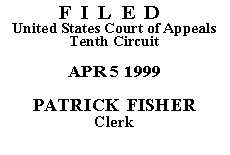

| SUSAN C. PURDY,
Plaintiff-Appellant, v. UNITED AIRLINES, INC., a Delaware corporation; RICHARD MARTINO, in his official capacity and individually, Defendants-Appellees. |
|
Plaintiff Susan C. Purdy appeals from an order of the district court granting defendants' motion for summary judgment. We affirm.
Ms. Purdy brought this action pursuant to Title VII, 42 U.S.C. §§ 2000e-2000e-17. She alleged employment discrimination due to her sex (female) and her association with a male friend of Mexican national origin.(1) She claimed that due to these factors, she was subjected to adverse employment actions which impacted the "terms, conditions, or privileges of [her] employment." Id. § 2000e-2(a)(1). She further claimed defendants had retaliated against her because of her complaints of discrimination. See id. at § 2000e-3(a). Ms. Purdy raised three state law claims arising from the same factual situations.
The district court held that Ms. Purdy had established a prima facie Title VII case. See McDonnell Douglas Corp. v. Green, 411 U.S. 792, 802 (1973) (setting forth requirements for prima facie Title VII case). The court determined, however, that Ms. Purdy had not shown that defendants' stated reasons for their actions were pretexual, see id. at 804, and granted summary judgment to defendants. The court declined to exercise jurisdiction over Ms. Purdy's state law claims and dismissed them.
On appeal, Ms. Purdy argues that the district court erred in granting summary judgment because material issues of fact are in dispute and she showed that defendants' proffered reasons for their actions were pretextual. She also contends her state law claims should not have been dismissed. Defendants urge us to find that Ms. Purdy failed to establish a prima facie case and affirm on that basis. See United States v. Sandoval, 29 F.3d 537, 542 n.6 (10th Cir. 1994) (appellate court may affirm district court on any grounds for which record is sufficient to permit conclusions of law, even grounds not relied on by district court). We decline this invitation.
We review the district court's ruling on a motion for summary judgment de novo examining "the record to determine whether any genuine issue of material fact was in dispute" and if "the substantive law was applied correctly." McKnight v. Kimberly Clark Corp., 149 F.3d 1125, 1128 (10th Cir. 1998) (quotation omitted). To forestall the entry of summary judgment in employment discrimination cases analyzed pursuant to the McDonnell Douglas framework, the plaintiff must refute the employer's response to the plaintiff's prima facie case by showing that a genuine dispute of material fact is present "as to whether the employer's proffered reason for the challenged action is pretextual." See Randle v. City of Aurora, 69 F.3d 441, 451 (10th Cir. 1995). Pretext cannot be established by allegations alone. Rather, the employee must present enough evidence to support an inference either that "a discriminatory reason more likely motivated the employer or . . . that the employer's proffered explanation is unworthy of credence." Texas Dep't of Community Affairs v. Burdine, 450 U.S. 248, 256 (1981); see also Drake v. City of Fort Collins, 927 F.2d 1156, 1160 (10th Cir. 1991) (in responding to summary judgment motion, "plaintiff must raise a genuine factual question as to whether defendant[']s reasons are pretextual").
Ms. Purdy began working for defendant, United Airlines, Inc., in 1984 and started working in the position of zone controller in 1986, where she was responsible for coordinating support for aircraft assigned to departure and arrival gates to ensure timely departures. Defendant Richard Martino was one of her shift managers and also was acting manager for the Station Control Center when the regular manager was absent.
In her complaint, Ms. Purdy alleged that prior to 1991, she had received "effective" ratings on her performance reviews. She contended that after Mr. Martino learned that she was dating a Mexican, her performance reviews declined to a "needs improvement" rating. She also contended that Mr. Martino treated her differently from other similarly situated employees.
The evidence shows that Ms. Purdy received two letters of complaint from a captain and from a ramp supervisor. Further, certain manual revisions were missing although Ms. Purdy had signed off as having completed them. The revisions were later found in her mail box in the original shrink wrap. Ms. Purdy responded that other employees must have removed the revisions from the manuals for use in their job and then returned them to her mail box instead of replacing them in the manuals. Due to these issues and others, Ms. Purdy's performance rating declined, and she was placed on probation.
Having reviewed the record and the parties' briefs on appeal, we agree that Ms. Purdy has failed to show that defendants' actions were pretextual. The reasons set forth by defendant are credible and Ms. Purdy has not shown that discrimination more than likely was the reason for defendants' actions.
The judgment of the United States District Court for the District of Colorado is AFFIRMED for substantially the reasons stated in its order of November 21, 1997. Defendants' motion to strike portions of appellant's appendix is GRANTED. See Aero-Medical, Inc. v. United States, 23 F.3d 328,
329 n.2 (10th Cir. 1994).
Entered for the Court
Circuit Judge
*. This order and judgment is not binding precedent, except under the doctrines of law of the case, res judicata, and collateral estoppel. The court generally disfavors the citation of orders and judgments; nevertheless, an order and judgment may be cited under the terms and conditions of 10th Cir. R. 36.3.
1. As Ms. Purdy's friend was born in Mexico and her claim is one of discrimination based on national origin, we refer to him as Mexican.